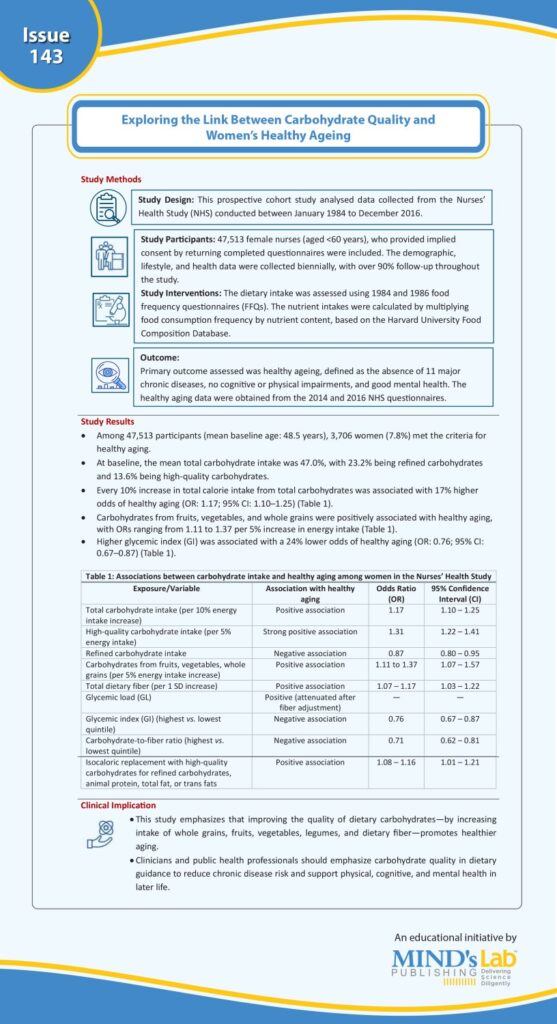
Diet is undoubtedly a key determinant of chronic disease, premature death, physical frailty, and healthy aging. In general, carbohydrates account for approximately 50% of the total energy intake in developed countries, with refined carbohydraetes accounting for 42% of the total calorie intake and only 8% of the total calorie intake is from high-quality carbohydrates such as whole grains, legumes, fruits, and vegetables.
Moderate carbohydrate intake (50–55% of the total energy) is associated with the lowest risk of all-cause mortality. Consumption of high-quality carbohydrates has been consistently linked to reduced risk of chronic disease and mortality. Despite this, the role of dietary carbohydrates in the development of healthy aging remains understudied.
Carbohydrate quality indices—including the carbohydrate-to-fiber ratio, glycemic index (GI; (a relative measure of the incremental blood glucose response per gram of carbohydrate), and glycemic load (GL; (the glucose response to both the quantity of carbohydrate intake and its GI)—offer additional insight into carbohydrate-related health risks. A high carbohydrate-to-fiber ratio has been associated with increased mortality risk, but its relationship with healthy aging is unclear. Similarly, while GI and GL have been widely studied in relation to chronic disease, their impact on healthy aging is yet to be fully elucidated.
A study by Ardisson Korat AV et al., published in the journal “JAMA Network Open”, aimed to investigate the association between long-term impact of dietary carbohydrate intake and carbohydrate quality on healthy aging in women from the Nurses’ Health Study (NHS). Healthy aging was defined as the absence of major chronic diseases, lack of cognitive and physical function impairments, and having good mental health. This prospective cohort study included 47,513 women aged under 60 in 1984, Of these, only 3,706 (7.8%) women met the criteria for healthy aging. Results showed that every 10% increase in the calorie intake of total carbohydrates and consumption of high-quality carbohydrates (OR, 1.31) were associated with a significant chance of healthy aging (17% and 31%, respectively), while refined carbohydrates were linked to a 13% lower odds of healthy aging. Carbohydrates and fiber from fruits , vegetables, and whole grains showed strong positive associations (up to 37% higher chances of healthy aging). Consuming foods with a higher glycemic index and higher carbohydrate-to-fiber ratio were inversely associated with healthy aging (24% and 29% lower chances of healthy aging, respectively).
The study concluded that carbohydrate quality, especially high intake of dietary fiber and whole-food sources, may significantly contribute to healthy aging in women (See Graphic).

(Source: Korat AV, Duscova E, Shea MK, Jacques PF, Sebastiani P, Wang M, Mahdavi S, Eliassen AH, Willett WC, Sun Q. Dietary carbohydrate intake, carbohydrate quality, and healthy aging in women. JAMA Network Open. 2025;8(5):e2511056-.)
